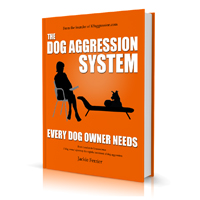More on social cognition: The takeaway from the paper: Social cognition in the domestic dog: behaviour of spectators towards participants in interspecific games is that spectator dogs preferred to approach the winner of the games opposed to approaching either winner or loser of a competition.
This is a really interesting study on a number of levels. But for now, it reminds us not to fall into the oversimplification trap. Simplification is valuable as a way to retain an idea to hang more complicated information on to. We are only human after all, and we can’t remember more than a few things at a time. But you can communicate some basic ideas that people are actually going to remember.
The trouble is, over simplification can also be misleading when we start to shape our whole interactions with our dogs around it without factoring into the complications or contradictions. This is a trap many new owners fall into when following advice. They suddenly lose that intuitive connection they have with their dogs as they follow a program that may not feel like second nature to them. In most cases, after a mild loss of innocence, the owner will regain it as they start to work with their dogs and start to fully absorb the lessons. That is probably the most interesting aspect about working with dogs with behavior problems. The lessons you learn continue to deliver meaning as you develop new facets of your relationship with your dog. Unfortunately, it takes time.
When you have a dog you need to change right now, and you are a hard worker, you do everything you can, everything that you are taught. Right now. If you have a dog with a behavior problem you are willing to give up everything you think you know because you assume it must have not helped you or you wouldn’t be dealing with the issue!
It’s kind of the double edge sword of human egos. For some of us, we honestly believe we can control these things, and that we haven’t, means our failure. If you are extra unlucky you find an “expert” who exploits that fact.
So we follow the plan, in hopes of taking on the new knowledge to steer us in the right direction. Except the new knowledge comes in simplified form, (so we can absorb is and actually use it). And inevitably something comes up that the plan doesn’t address.
There is a lot discussed in NILIF (Nothing in Life is Free) theories that we must control the resources to gain or maintain the leadership role. There is a lot of advice giving us different variations how gain control over resources. In fact even the word “resources” in this context is so tightly integrated with the “dog advice industry”. Most people know of resources, as the stuff the dog wants. If you are using the word resources, you’ve probably been studying up on dogs that are misbehaving.
But this abstract reminds us that our relationship with our dogs does not start and end with control. Dogs perceive intent, and that they are not just paying attention to how we treat them, but they are also gathering information about how we relate to others in the world. Social learning and cognition is not just about one to one interactions.
It made me think about family dynamics, dog behavior issues and how little anyone talks about whatever else is happening in the home. Of course that’s personal and some people have even been criticized for discussing their conflicts with their significant other on dog forums. So, just out of curiosity, I did a search on Google for the phrase “don’t argue in front of the dog” on Google just to see what came up. That’s advice I hear for parents, but has anyone actually suggested this for dogs?
I found about four links: one on a marriage site said, “Don’t argue in front of the dog (he’ll suspect a challenge for leadership of the pack and he’ll side with the victor to secure his advancement in the ranks, much like a Klingon.) ” Well, its good natured advice complete with the typical idea that dogs are ambitious social climbers and only view the world in terms of who they can step on to get to the top, where at the top they will order us to make their breakfast (like they don’t already).
But, maybe the advice should be: don’t argue in front of the dog because he might not want to approach either one of you. Oh – I think I sense a whole new self-help industry starting to bloom as I write.
But it does put a spin on things for people who are dealing with owner-aggressive dogs. What might we be doing in our interactions with others that is our dogs or picking up, or are misinterpreting about who we are and what our intension might be?

